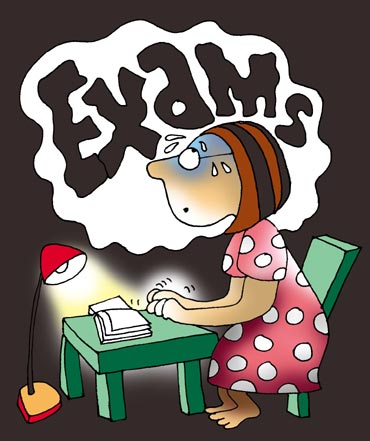Photographs: Rediff Archives Divya Nair
The Symbiosis National Aptitude 2011 exam allegedly featured questions taken from Web sites of coaching institutes, repeated answer options, incomplete information besides spelling and typography errors.
Divya Nair checks if these allegations have any merit.
For a couple of days, some media outlets have reported errors in the SNAP 2011 paper following complaints from students who appeared for the test on December 18.
Some of the allegations made by students and training experts include questions taken from coaching institute Web sites, repeated answer options, incomplete information besides spelling and typography errors.
On December 20, the Symbiosis International University, Pune, which conducts the SNAP test for admission to MBA programmes at its institute, took a stand on the allegations.
The Symbiosis Web site displayed a letter of clarification, maintaining that 'A prima facie investigation has not found anything wrong in the SNAP examination.. Still the university administration is carefully looking into all the complaints received.'
The letter signed by Madhu Sharma, Registrar, Symbiosis International University, further reads: 'We wish to clarify that the University does not have any tie up with any coaching institution.'
Some experts allege that the questions in the SNAP 2011 paper were taken from Web sites like Bullseye, Ascent Education and a career blog (currentaffairsappsc.blogspot.com/2011/06/current-affairs-mcqs.html).
When I asked K S Baskar, who heads Ascent Education about the allegations, he said Ascent has posted questions of varying difficulty on its Web site for students and the teaching community to practice from.
As it is in the public domain, Baskar added one is free to use the information.
A spokesperson from a coaching centre whose questions allegedly appeared in the SNAP 2011 paper this year, revealed, on condition of anonymity, that about four questions were repeated from its Web site.
"It is unfortunate that the institute did not change names or rephrase it,' the spokesperson said.
"These days," the spokesperson added, "information is available for everyone to use in the public domain. If the information was available for free, students should not have a problem. But that doesn't excuse the authority responsible for setting the question paper who should have ensured that they had the question paper mock solved once or proof-read it by a student swearing by a non-disclosure agreement."
'This way," the spokesperson felt, "they could have easily done away with the spelling errors and typos."
Please ...
'We have not picked questions from any blogs'
Photographs: Uttam Ghosh/Rediff.com
When I requested the University to explain its stand, Lalit Kathpalia, Director, Symbiosis Institute of Computer Studies and Research, responded by e-mail on behalf of SIU, and said that any occurrence of questions that may have been taken from any blog or Web site is purely "coincidental."
In his e-mail, Kathpalia said, "This (appearance of questions that are on other sites) is purely coincidental and we have not picked up any questions from any blogs."
Kathpalia revealed that the institute had faced typographical and spelling errors in the past and has set up an external committee to review the said question paper and help the institute serve students better in the future.
"We have had some concerns in our earlier papers and our efforts have always been to improve our academic process of conducting the exam," Kathpalia said.
"We have appointed a committee of external experts to looks into such discrepancies and their decision/recommendations are awaited," he added. "We would abide by the decisions/recommendations of the committee."
Heena Magoo, who appeared for the exam in Mumbai, reported spelling and typography errors. "I think there were six sets of questions. I took the 'F' set," Magoo said.
"In my set," she added, "the word messenger was wrongly spelt as 'massenger' and one of the questions had the answer option '30 minutes' repeated twice."
When asked what measures the Institute has been taking to ensure that such errors are not repeated, Kathpalia stated, "We have processes which take care of this aspect, namely to avoid errors, and we have been successful for the last eight years. But we are open to improvements."
Experts I spoke to felt these errors should not deter students who should focus on their performance than indulge in blame games.
A R K S Srinivas, a former director of T.I.M.E, an institute that trains students for management examinations, went through the SNAP 2011 paper for Rediff.com
"Since institutes like Symbiosis have a new committee of members who set the question paper each year," Srinivas said, "some of them are relatively new to the process."
Please ...
'Since when did typing errors affect a student's performance?'
Photographs: Uttam Ghosh/Rediff.com
"There are several resources available on the Internet," Srinivas said. "I personally don't think the exam committee would have copied questions from Ascent or Bullseye for that matter."
"I think the questions could be lifted from one of the question banks or larger resource books, that is if they were," he added.
"While doing so, they could have ensured that they at least change the names or rephrase it in such a way that they don't face legal issues like copyright," he pointed out, highlighting how the GRE and GMAT question papers also repeat questions, but are rephrased each time.
Srinivas agreed with some students' expressed views that the current year's SNAP paper was tougher than last year's question paper, but felt it was well designed.
The errors were typos and not an impediment to a student's performance in any way, he said.
"Since when did typing errors affect a student's performance?" he asked. "If students are looking for an excuse for their lack of performance, they are stretching it a tad too far."
"The Quantitative Analysis and Logical Reasoning sections were definitely tougher than last year," Srinivas said. "But students must understand that LR had 30 questions of 2 marks each compared to the English section, which had 40 questions of 1 mark each. It is common knowledge that the questions in the former section will be lengthy and challenging."
While going through the SNAP General Knowledge section, Srinivas felt, "The questions asked in the General Awareness section are absolutely relevant from a would-be-manager's point of view. There are questions on economic and political affairs. So what's wrong in that? As a management aspirant, you are required to be aware of these questions."
Clarifying the complaints mentioned by some students, Srinivas said, "The one option that students say has been repeated is not the correct option. That the spelling of messenger is wrongly typed as 'massanger' should not affect students who understand English. About the pie chart which has an error, I think students are talking about the extra comma and zero on the top of the chart which has nothing to do with the question."
Srinivas believes that since the question paper was relatively tougher than last year's question paper, the cut-offs will also be comparatively lower and favourable for students.
"Last year's cut- off was 115," he said, "but this year, you can expect the cut-off to be anywhere between 100 and 105 out of 180."




Comment
article